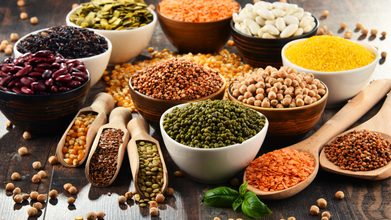- Health Conditions A-Z
- Health & Wellness
- Nutrition
- Fitness
- Health News
- Ayurveda
- Videos
- Medicine A-Z
- Parenting
Think Microwaves Cause Cancer? Debunking Common Myths About Reheating Food

Microwaving food
How many of us take advantage of our microwave oven when it comes to reheating leftovers or quickly warming up a meal? It's fast, efficient, and convenient. But, through casual conversations in the kitchen or viral online postings, some of these myths have stuck-or perhaps better, taken root. One of the most common is that operating a microwave might increase the chances of getting cancer. Sound familiar? Let's debunk these myths and let your mind rest easy so that your microwave can continue serving you guilt-free meals!
Perhaps one of the most lingering myths about microwaves is their supposed propensity to cause cancer because they emit radiation. This misconception arises from a fear of the word "radiation" itself. But all radiation is not created equal: microwaves use nonionizing radiation, and it is essentially not the same as nasty ionizing radiation-such as X-rays or gamma rays-and in that respect, it does not have nearly enough energy to knock electrons loose from atoms or break DNA, so it cannot cause cancer.
Microwaves cook food by agitating the water molecules, causing those molecules to eventually produce heat. But whereas boil water cooking would take a pretty long time, microwaves can achieve it in a jiffy. Since regulatory agencies that include the World Health Organization (WHO) and the U.S. Food and Drug Administration (FDA) also did their homework on microwave safety, they have confirmed that microwaves are absolutely safe if you're going to use them the right way to reheat food. So don't worry – your microwave is not a secret health killer.
Does Microwaving Kill Nutrients?
Another extremely widespread misconception is regarding the loss of nutrients in microwaved foods. Though, indeed cooking tends to strip off the nutrients from food items, microwaving happens to be one of the more lenient cooking procedures. As it cooks food quite quickly, requiring minimal water in most cases, microwaving can better retain nutrients than other cooking, such as boiling or frying, which keeps food in contact with heat for a longer duration.
And so, the microwave becomes an unlikely friend towards the preservation of vitamins and minerals in your food-so you can reap in what you have sowed.
Why Microwaves Are Safe and Efficient?
Other than the one myth they coined for canceling cancer, here's why microwaving your food to reheat may be better than stovetop heating:
1. Efficiency: Microwaves heat faster than a stove, saving you time and energy.
2. Uniform Heating: There are no hot spots or burnt edges and rear in microwave ovens.
3. Nutrient Retention: As it has already been discussed above, microwaving appears to be having the potential for retention of more nutrients than the high temperature-based cooking processes.
4. Safety : Unlike stovetop heating where food turns burnt or toxic products can be formed because of high heat, microwaving is safer for reheating.
Of course, not all approaches to microwave application are equal. Always remember to use *microwave-safe containers*—glass or BPA-free plastic are best. Avoid using metal or non-microwave-safe plastics that could leak harmful chemicals into your food.
Busting Popular Myths About Microwaves
Here are some popular myths about microwaves and the truth behind them:
Myth: Microwaves make your food radioactive.
Fact: No, microwaves simply make the water molecules vibrate and generate heat. It doesn't change the molecular structure of your food's molecules or make it radioactive.
Myth: Heating water in a microwave changes its DNA.
Fact: Water does not have DNA, nor does microwaving impact the molecular structure of water enough to kill a plant. This just another viral myth that has no scientific basis.
Myth: There is some truth to the fact that microwave-reradiated food is not as good for you as stovetop-reheated food.
Fact: Actually, microwave reheating can help keep the nutrients better, because the cooking is shorter and at a lower temperature than when stovetop reheating.
How Microwave Myths Harm Our Health
These myths may cause undue stress and confusion about how best to prepare your food safely. Perhaps of greater concern, though, is how myths and misinformation spread in the digital age. Questioning our habits is normal, but in something as important as health and wellness, we need to go by science-proved information only. Your microwave is not the enemy, but it is something that can help restore your hectic, fast life.
The next time someone tries to tell you that heating up your food in a microwave will poison your meal, or strip out the nutrients, call their bluff. Microwaves are safe, efficient, and nutrient-friendly ways to reheat food. In fact, it may have an advantage over conventional cooking. So, have a good leftovers' meal, no worries. You are being smart and healthy!
Yes, You Can Eat More and Still Lose Weight, Here’s the Diet That Makes It Possible

Credits: iStock
Could there be a diet that allows you to eat more and still helps you lose weight? For the longest doctors and health experts praised the Mediterranean diet. This is because it is heart-friendly, and has a mix of fruits, whole grains, vegetables, and sea food. However, new research suggests that even a simpler diet would work better. As per British scientists, by simply cutting out ultra-processed foods, and sticking to unprocessed whole foods could lead to greater calorie reduction and weight loss.
Eating More, And Still Losing Weight? What Is Working
The key is to reduce the intake of calories, which is possible when you cut your ultra-processed foods. In a study, researchers found that people who followed a completely unprocessed diet consumed around 330 fewer calories per day than those who ate more processed food.
What surprised scientists was that participants actually ate more food by volume. Those on the whole-food diet consumed about 57 percent more food overall, yet still ended up eating fewer calories. The reason lies in the type of foods they chose, such as fruits, vegetables, salads, and lean proteins, which are naturally lower in calorie density.
This means people could eat larger portions, feel full, and still reduce their total energy intake.
Read: Ultra-Processed Foods May Add 330 Extra Calories A Day, Study Finds
Why Are Ultra-Processed Foods Problem?
Ultra-processed foods, often called UPFs, include items like ready meals, packaged snacks, sugary cereals, sweets, and hot dogs. These foods are typically high in calories, sugar, unhealthy fats, and additives, while being low in fiber and nutrients.
Ultra-processed foods, engineered with additives, preservatives, and artificial ingredients, now comprise over half the average American diet, based on data from the U.S. Department of Agriculture. Their ubiquity and intensive marketing have made them seem inevitable, but accumulating evidence indicates that the health toll is much more serious than realized.
Under the NOVA food classification system, UPFs are defined by their intensive industrial processing, which is typically used to produce hyper-palatable and highly profitable foods. Yet, the convenience comes with an increasingly large body of evidence showing that these foods contribute to a variety of chronic diseases, including cardiovascular disease, obesity, diabetes, depression, and various forms of cancer.
Researchers say UPFs may quietly push people towards overeating without realizing it. Even small portions can contain a large number of calories, making weight gain more likely over time.
The study suggests that when people are given the option to eat foods in their natural or minimally processed form, they tend to make smarter choices on their own.
Also Read: Are All Ultra-Processed Foods Bad For You? Experts Say Some Are Better Than Others
How Was The Study Conducted?
The research followed 20 overweight adults, including 10 men and 10 women, with an average age of 31. Participants were divided into two groups.
One group followed a two-week diet based on minimally processed foods such as vegetables, fruits, salads, and lean meats. The other group ate a diet rich in ultra-processed foods like hot dogs and ready meals. After two weeks, the groups switched diets.
Importantly, the meals were matched for nutrients such as fat, protein, carbohydrates, salt, and fiber. Despite this, those eating whole foods consumed fewer calories and lost nearly one kilogram in weight.
Feeling Fuller and Reducing Cravings

Researchers believe fruits and vegetables played a key role. These foods are high in water and fibre, which lowers their energy density. As a result, people can eat more without consuming too many calories.
Experts also point out that natural fiber helps people feel full for longer and supports gut health. Fibre can trigger hormones that regulate appetite, reducing cravings and helping with long-term weight control.
What This Means for Everyday Diets
The findings add to growing evidence linking ultra-processed foods to a range of health problems. Studies have previously associated high UPF intake with dozens of illnesses.
In the UK, ultra-processed foods make up about 57 percent of the average diet, one of the highest levels in Europe. Experts recommend that around 80 percent of daily food intake should come from whole or minimally processed foods.
The message from scientists is simple. You do not need complicated diet rules. Choosing foods closer to their natural form may help you eat better, feel fuller, and lose weight more sustainably.
Ultra-Processed Foods May Add 330 Extra Calories A Day, Study Finds

Credits: Canva
A small study suggests that people who avoid ultra-processed foods (UPFs) consume around 330 fewer calories each day on average—even while eating more by weight. Researchers say that when food is offered in its natural, unprocessed form, people tend to make “much smarter decisions.”
The study, conducted by the University of Bristol, reanalysed data from a U.S. clinical trial with 20 participants, which had found that eating only UPFs leads to overeating and weight gain. The team discovered that people eating solely whole foods naturally chose fruits and vegetables over higher-calorie items like pasta and creamy dishes.
Also Read: 11 Brain And Nerve Symptoms Neurologists Say Can Become Life-Threatening
Ultra Processed Foods: What Are They?
Ultra-processed foods are ready-to-eat products made in factories using industrial methods. They rely on chemically modified ingredients and additives rather than whole foods, and often contain little to no real nutrition. Instead, they are loaded with sugar, saturated fats, and salt, which can contribute to chronic health problems over time.
Ultra Processed Foods: How Whole Foods Change Eating Habits
According to the study, as per The Independent, people avoiding UPFs ate 57% more food by weight. Jeff Brunstrom, professor of experimental psychology at the University of Bristol, explained: “It’s exciting to see that when people are offered unprocessed options, they instinctively select foods that balance taste, nutrition, and satiety while still reducing overall calorie intake. Our dietary choices aren’t random—when food is in its natural state, people actually make smarter decisions than we expected.”
Ultra Processed Foods: Common Examples
According to NOVA, ultra-processed foods are ready-to-eat or ready-to-heat products made mostly from industrial ingredients and additives, rather than whole foods. Common examples include:
- Chips
- Carbonated drinks
- Instant noodles
- Ice cream
- Chocolate
- Biscuits
- Sauces and instant sauces
- Ready-made meals
- Mass-produced packaged bread
- Sausages and hot dogs
- Burgers
- Chicken and fish nuggets
- Instant soup
- Meal replacement shakes and powders
- Candy
- Pastries
- Fruit yoghurt
- Fruit drinks
- Cake mix
- Margarine
- Sweet or savory packaged snacks
- Energy bars
These foods are often high in sugar, salt, and unhealthy fats, and low in natural nutrients.
Ultra Processed Foods: Vitamin Fortification Can Mislead
The research also highlighted a concern: some UPFs meet micronutrient requirements through fortification. For example, pancakes and French toast sticks contained vitamin A. However, participants consuming only whole foods got their vitamin A from carrots and spinach, which are far lower in calories.
Ultra Processed Foods: The Calorie-Micronutrient Trade-Off
Dr. Annika Flynn, senior research associate at the University of Bristol, said: “This suggests that UPFs can deliver both calories and nutrients in a single product, which may lead to overconsumption. Whole foods, on the other hand, maintain a healthy balance, encouraging people to favour nutrient-dense options like fruits and vegetables instead of high-calorie foods such as pasta and meat.”
Ultra Processed Foods: Why This Matters for Everyday Eating
The findings underline how simple changes—choosing minimally processed, whole foods—can naturally reduce calorie intake without feeling restrictive. By letting people eat more volume while cutting energy intake, whole foods may help manage weight and improve overall nutrition.
Experts Say Oat Milk Might Not Be The Best Morning Choice; Here’s Why

Credits: Canva
Health specialists have cautioned that a widely used dairy milk alternative may come with downsides many people are unaware of, especially when consumed first thing in the morning, according to Mirror. Oat milk, a popular plant-based and dairy-free option, is often praised for its fibre content and for being fortified with calcium and vitamin D, both important for bone health. However, dietitians point out that compared to other plant-based milks such as almond milk, oat milk tends to contain higher amounts of carbohydrates, added sugars and oils.
What Is Oat Milk Made Out Of?
Oat milk is a dairy-free, plant-based drink that is commonly valued for its fibre content and added calcium and vitamin D, which support bone strength. That said, health experts note that it generally contains more carbohydrates, sugars and oils than many other plant milks, including almond milk.
Registered nutritionist Jenna Hope explains that oat milk is usually produced by creating a syrup from oats, which is then mixed with water. She adds that many well-known oat milk brands also include added oils, emulsifiers and stabilisers to improve texture and shelf life.
Why Is Oat Milk Bad For Your Health?
Experts say certain aspects of oat milk may negatively affect health, particularly when consumed on its own. Speaking to Parade, registered dietitian Melissa Rifkin said that while oat milk lattes can fit into a healthy diet, they are not nutritionally complete by themselves. She noted that although oat milk offers some fibre, most oat milk lattes are low in protein and fat, two nutrients that help regulate blood sugar levels and promote fullness.
Sharing a similar view, registered dietitian Nour Zibdeh told The Independent that oat milk’s high carbohydrate content can lead to sharp rises in blood sugar when consumed in the morning. This effect is less pronounced with dairy milk, which naturally contains protein and fat that help balance its sugar content.
Ms Zibdeh also told Parade that oat milk is low in protein and fat, which contributes to greater blood sugar spikes. French biochemist and author Jessie Inchauspé, widely known as the “Glucose Goddess”, has also criticised oat milk. In a 2024 interview with American entrepreneur Marie Forleo, she described oat milk as similar to drinking “starch juice”, explaining that oats are a grain and grains are primarily made up of starch.
Should You Replace Oat Milk With Cow Milk?
Overall, nutrition experts tend to agree that cow’s milk offers greater nutritional value. Regular dairy milk intake has been linked to better metabolic and heart health, and cow’s milk contains higher levels of key micronutrients such as phosphorus, which supports healthy bones and teeth, along with calcium, vitamin D, B vitamins and potassium, compared to oat milk.
That said, cow’s milk is not suitable for everyone. Allergies, taste preferences and vegan diets mean many people rely on plant-based alternatives. If oat milk is your preference, there is no need to panic. Experts stress that moderation is key and that oat milk can still be enjoyed as part of a balanced diet.
Choosing oat milk does not mean it needs to be completely removed from your routine. There are simple ways to enjoy it while being mindful of expert advice. For those who love an oat milk latte, pairing it with protein-rich foods such as eggs or Greek yoghurt can help balance blood sugar levels and make the meal more satisfying.
© 2024 Bennett, Coleman & Company Limited

